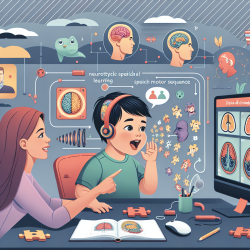The world of education and therapy for children with Autism Spectrum Disorder (ASD) is constantly evolving, and staying updated with the latest research is crucial for practitioners. One recent study, "Coconuts and curtain cakes: The production of wh-questions in ASD," provides valuable insights into the unique challenges faced by children with ASD in producing wh-questions. Here, we’ll explore how practitioners can apply these findings to improve their skills and better support their students.
Understanding the Study
The study examined Hebrew- and French-speaking children with ASD, focusing on their ability to produce wh-questions (e.g., who, what, where). The research found that while children with ASD often have similar correct production rates to those with Developmental Language Disorder (DLD), their error types differ significantly. Children with ASD frequently make pragmatic errors—responses that are contextually inappropriate—rather than syntactic errors.
Key Findings
Some of the key findings from the study include:
- Children with ASD produced fewer syntactically well-formed wh-questions compared to typically developing (TD) children.
- The most common errors among children with ASD were pragmatic, such as providing irrelevant answers or making incorrect guesses about hidden objects.
- These pragmatic errors were consistent across different languages, suggesting a core deficit in the pragmatic use of language.
Practical Applications for Practitioners
Understanding these findings can help practitioners tailor their approaches to better support children with ASD. Here are some practical applications:
1. Emphasize Pragmatic Skills
Given that children with ASD often struggle with the pragmatic aspects of language, incorporating activities that focus on context-appropriate responses can be beneficial. Role-playing scenarios and using visual aids to depict social situations can help children understand the use of wh-questions in context.
2. Fine-Grained Error Analysis
Practitioners should conduct detailed analyses of the types of errors children make. By identifying whether errors are syntactic or pragmatic, practitioners can tailor their interventions more effectively. For example, if a child frequently makes pragmatic errors, the focus should be on improving their understanding of social cues and appropriate responses.
3. Cross-Linguistic Insights
The study's findings suggest that pragmatic deficits in ASD are consistent across languages. Practitioners working in multilingual settings can apply these insights to support children with ASD, regardless of the language they speak. This might involve creating bilingual resources that emphasize pragmatic language skills.
4. Collaborative Efforts
Collaboration between therapists, educators, and researchers can lead to the development of more effective intervention strategies. Sharing insights from studies like this one can help create a comprehensive support system for children with ASD.
Encouraging Further Research
While this study provides valuable insights, there is always more to learn. Practitioners are encouraged to stay engaged with current research and consider conducting their own studies to further explore the unique language challenges faced by children with ASD. Continuous learning and adaptation are key to providing the best support possible.To read the original research paper, please follow this link:
Coconuts and curtain cakes: The production of wh-questions in ASD.










